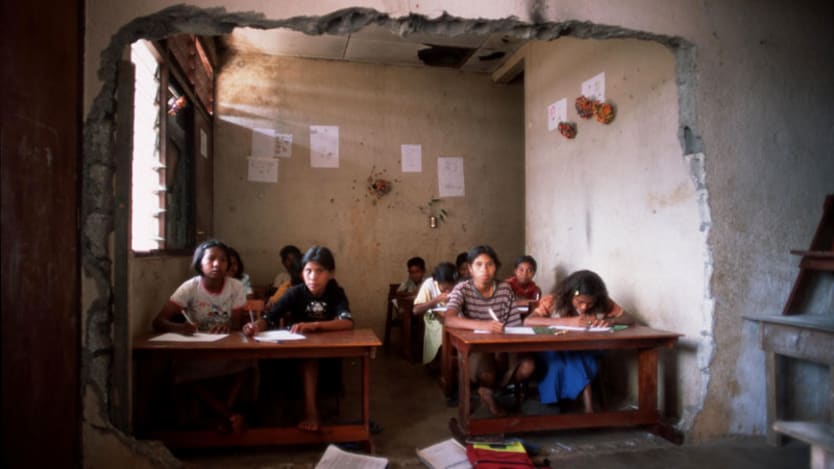
Recent news headlines have invariably highlighted the plight of forcibly displaced people fleeing violence in Syria and other trouble spots. The tragic stories that play out on our television sets bring into sharp focus the horrors of conflict, the impact on people’s lives, and the pressure on communities and countries. At personal and collective levels, these stories create a sense of disquiet.
Far too often, public perception and policy responses follow the news cycle, which tends to highlight a single conflict for a short time, before moving onto whichever topic next grabs the viewer’s attention. The reality is that fragile situations and violent conflicts exist beyond the places that make the headlines. And in most cases, the real issues fester long before and after the cameras have left.
The real work that needs to be done requires longer-term engagement, far beyond the immediate need to deliver humanitarian assistance. Addressing fragility and ending or preventing violent conflicts requires long-term, sustained engagement, and cooperation among multiple stakeholders.
Lessons from evaluation
Earlier this month, the Independent Evaluation Group hosted a discussion to reflect on the causes and consequences of fragility and conflict. Speakers included representatives from development agencies, including the United Nations and World Bank, as well as key stakeholders from governments, academia and the private sector.
At IEG, we have done extensive evaluative work recently to inform the World Bank Group’s approach to dealing with situations of fragility, violence and conflict. This included two evaluations that assessed the effectiveness of the World Bank Group’s work. One study focused on low-income fragile and conflict-affected states and one on middle-income countries that face situations of fragility. We have also looked at other examples of crisis responses.
“Addressing fragility and ending or preventing violent conflicts requires long-term, sustained engagement, and cooperation among multiple stakeholders.”
— Caroline Heider, director general of the Independent Evaluation Group at the World BankToday, 35 client countries of the World Bank Group face situations of fragility. An estimated 2 billion people live in these countries. Looking at the World Bank Group’s extensive experience working in client countries allowed IEG to draw on a rich resource of interventions and to draw relevant lessons so that successes can be replicated and avoidable mistakes are not repeated.
So what can the development community and other stakeholders learn from the World Bank Group’s engagement in situations of fragility and conflict? Here are six things our evaluation uncovered:
1. For the most part, IEG found that the World Bank Group’s comparative advantage lies in tackling long-term development challenges. What makes for success is early engagement, sustained presence, and continuous dialogue with all the parties involved.
2. Not surprisingly, the World Bank Group is more effective when its interventions are based on a good understanding of the local context. In particular, the drivers of conflict, the political economy, and issues of inclusive growth need to be understood. This requires a deep knowledge of how to, for example, economically empower women, or promote private sector growth and jobs. Our work, however, shows that this kind of in-depth analysis and understanding has not been consistently developed or used. And this tends to be true for many other development institutions.
3. In low-income countries experiencing fragility, support for state building is essential. A key to success is understanding the political economy and using this in reform processes. Rallying all key stakeholders around a carefully sequenced set of priorities is essential to see state building. And so is sustained and consistent support from partners.
4. In middle-income countries, the World Bank Group and other partners can do more beyond supporting livelihoods in conflict-affected communities. Investments are needed in a functioning public sector, particularly its financial management, and in fostering an environment that allows the domestic private sector to grow, and international investors to come in.
5. When it comes to crisis response, our evaluations found that great commitments are made when an emergency makes the news headlines, but follow-through is weak as soon as the spotlight is off. Instead of trailing the cycle of calamities, countries and their partners have to get ahead of the curve. In good times, they need to build institutions and systems that equip them to prevent calamities and respond to them quickly when needed.
6. For multilateral institutions, such as the World Bank and U.N., we see the need for greater collaboration among all the actors. Each of the actors has its comparative advantage. Responding collectively is essential to make the best use of expertise and resources. Addressing these areas can be an important first step in enabling the development community to make a shift that places more emphasis on sustained efforts to build capacities. And it will help ensure that we are building the institutions needed to prepare for and respond more quickly to the fallout of calamities — whether from conflict, disasters, climate change, or diseases.
Join the Devex community and access more in-depth analysis, breaking news and business advice — and a host of other services — on international development, humanitarian aid and global health.








